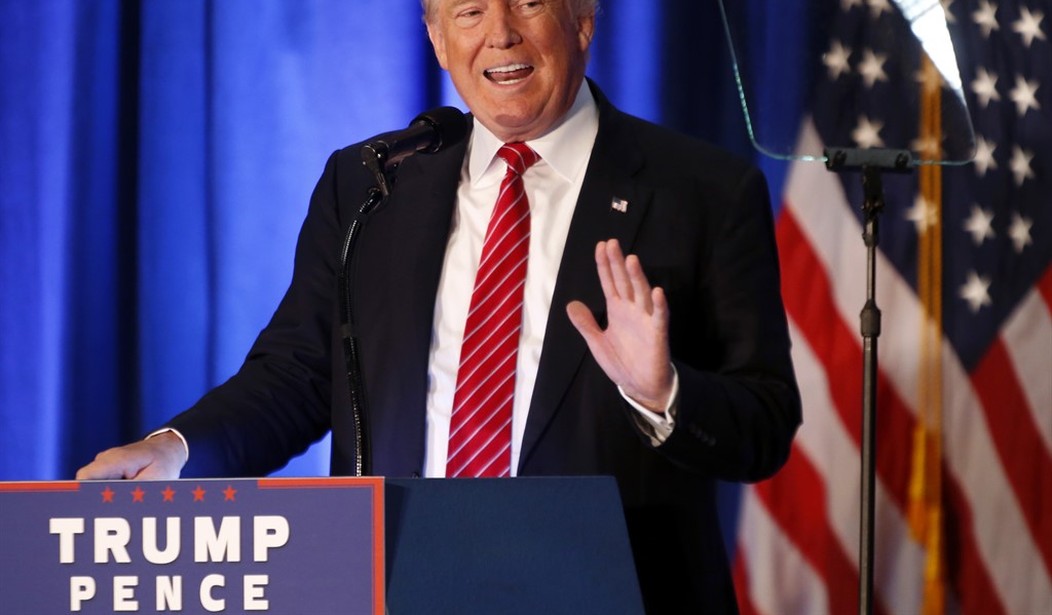To listen to both his defenders and critics, Donald Trump represents the U.S. version of a new nationalism popping up around the world. I'm not so sure.
In a fairly representative analysis, Politico's Michael Hirsh explained the "new nationalism" as "a bitter populist rejection of the status quo that global elites have imposed on the international system since the Cold War ended, and which lower-income voters have decided -- understandably -- is unfair."
James P. Pinkerton, writing for the stridently pro-Trump website Breitbart.com, sees nothing less than a "Worldwide Trumpian Majority" forming to oppose globalization in all its forms.
Interestingly, commentators across the ideological spectrum also agree that these trends are fueled by economic conditions -- manifested here as outrage at Wall Street and global trade deals -- and can be solved by some government response. Both Trump and Hillary Clinton offer similar solutions, such as more trade barriers and massive infrastructure spending.
That interpretation is fine as far as it goes, but I don't think it goes very far. Ultimately, the term "nationalism" distorts more than it clarifies about what's going on with Trump supporters in the United States.
First, suggestions that a Trumpian nationalism is rising among all low-income Americans could only be true if all low-income Americans were white. Reading Breitbart.com's celebrations of populist nationalism or the constant invocations of "We the People" from Trump supporters on social media might leave you with that impression. This is not to say that everyone who supports Trump is a "white nationalist" -- which conjures various racist doctrines. Rather, it is to simply point out that Trump's support is overwhelmingly, almost exclusively, white.
Clinton, according to some polls, gets nearly 9 out of 10 Latino voters and 9.9 out of 10 African-American voters. When Trump pointed out a black attendee at one of his rallies and said, "That's my African-American," he might have been speaking literally.
Recommended
I think commentators focus on the broad-stroke economic arguments because the real issues -- the American cultural ones -- are so fraught. Simply put, this so-called nationalism in the U.S. is really little more than a brand name for generic white identity politics.
Liberals are uncomfortable discussing this; to do so would acknowledge how they failed the white working-class voters who were once the emotional heart of the Democratic Party but are now the core of Trump's support. The Democrats' emotional heart now revolves around a diversity-mania that left many of its traditional voters feeling deserted -- or as President Obama once put it, bitterly clinging to their guns and their Bibles.
The Trumpian nationalist right wants to stay focused on economics, because to be open about their cultural appeal would be to admit that they have surrendered to the logic of left-wing identity politics.
Imagine for a moment you are a member of the working white poor in the parts of America that J.D. Vance writes about in his best-selling "Hillbilly Elegy: A Memoir of a Family and Culture in Crisis." Imagine how ridiculous phrases like "white (male) privilege" sound to you. Imagine you are an evangelical Christian, repeatedly told by elites and authority figures that your faith is the source of un-American injustices -- but that to suggest Islamic terrorism might have some relationship to Islam is rank bigotry.
Every year, liberal pundits metaphorically rub their hands in glee at the latest demographic projections forecasting the dissolution of the white majority in the United States. Is it so shocking that some white people might not greet that prospect with the same glee -- particularly when they have not seen tangible benefits from the immigration that is the source of all that diversity?
Daily, I receive emails and comments from people who describe themselves as nationalists -- but who are, in fact, making arguments for white culture as if whites were now an oppressed minority in need of an American government that zealously defends their interests. Right or wrong, many of them believe that Trump will protect white culture from the forces of multiculturalism, and Christianity from spreading secularism.
Which brings me back to why I think "nationalism" is a poor word to describe what we're witnessing in this election.
If nationalism is supposed to do anything, it's supposed to unify the country. When I look at these so-called nationalists, though, I don't see a unifying force. I see the latest entrants into a decades-old game of subdividing the country into tribes seeking to yoke government to their narrow agendas.

























Join the conversation as a VIP Member